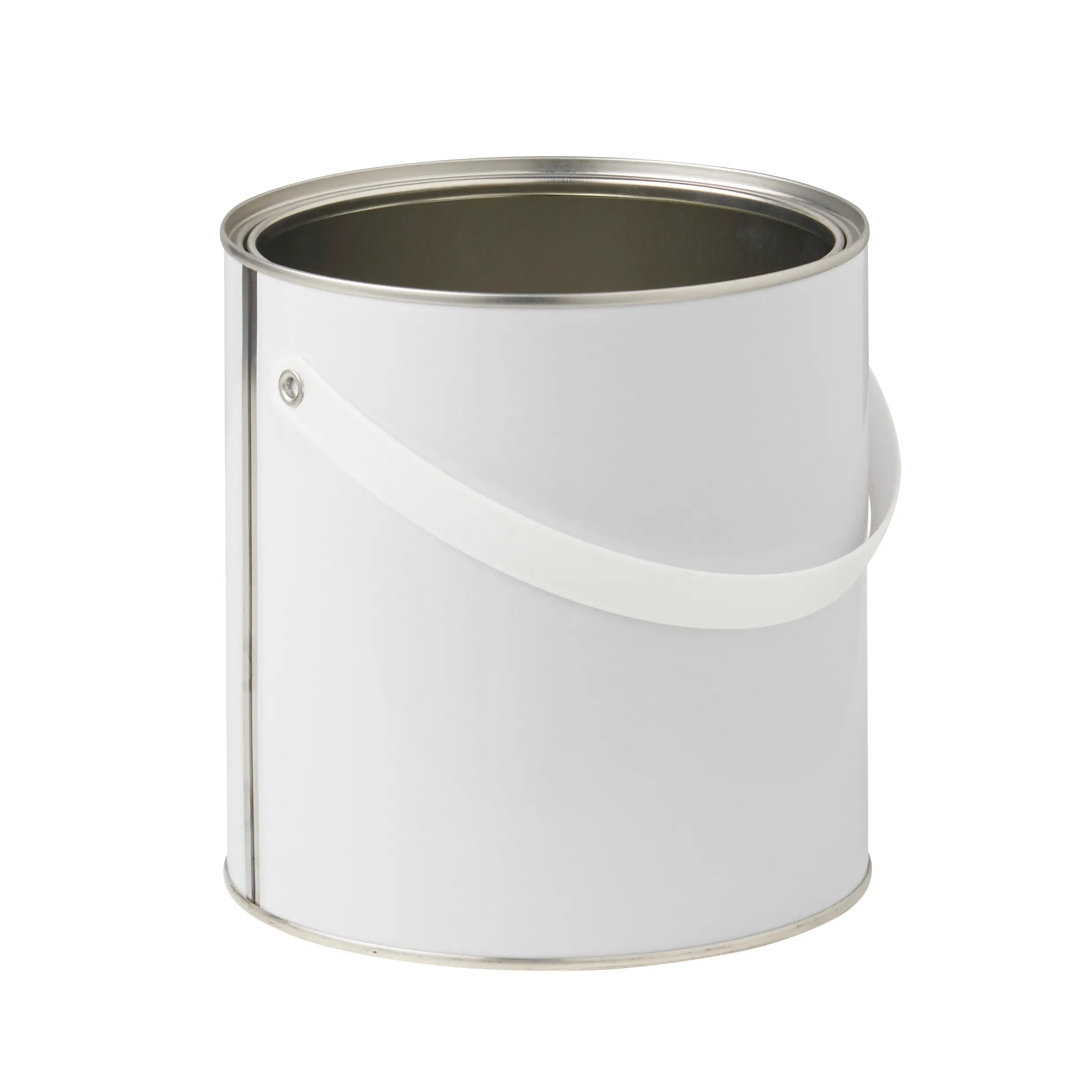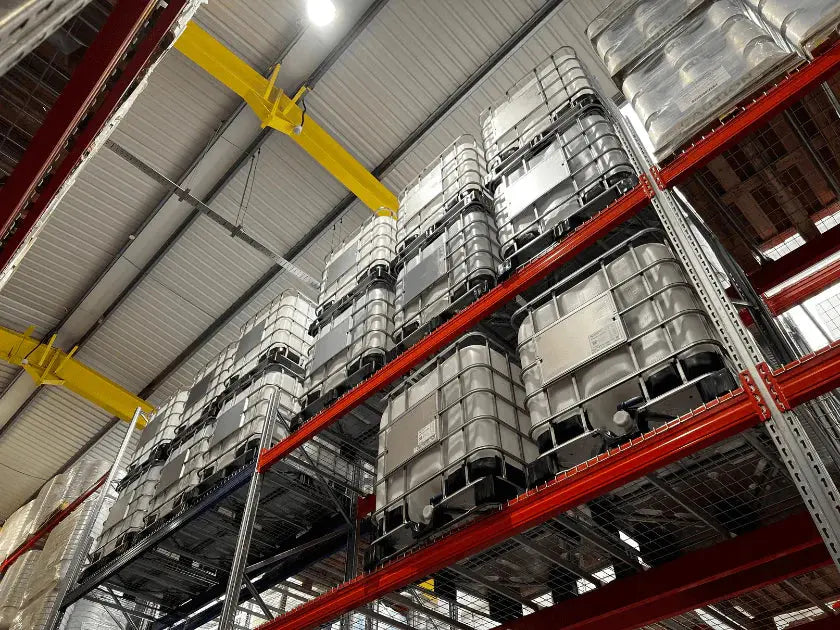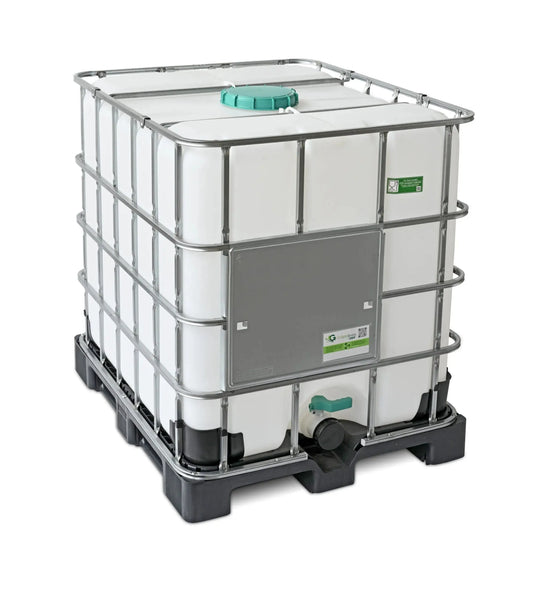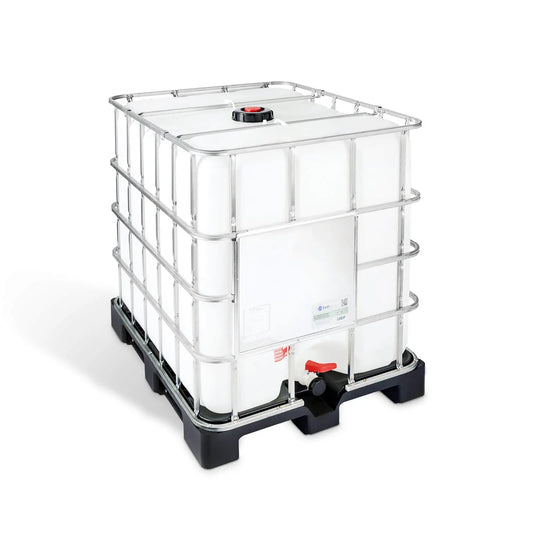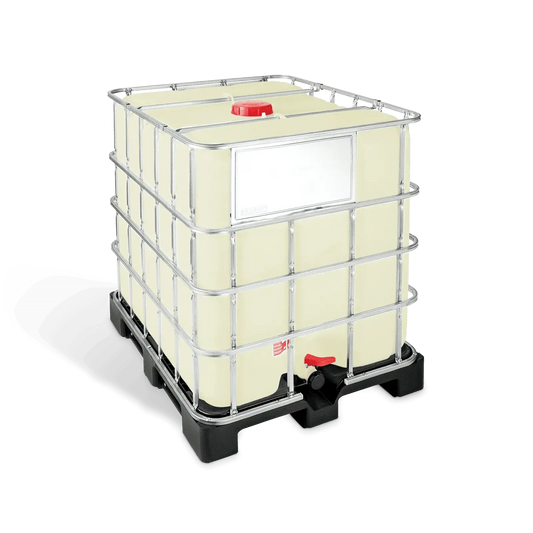When it comes to storing large quantities of liquid there's one choice of container that dominates. The IBC tank, a durable plastic cube caged in metal can be found everywhere, from farmyards to warehouses to campsites. Whenever there is a need to safely store large quantities of liquids Intermediate Bulk Containers (IBCs) are the answer. So what is it that makes IBC tanks so good, and how do you make sure they are right for your business?
Intermediate Bulk Containers (IBCs) are invaluable for businesses across various sectors, including agriculture and industry. These versatile containers, offer a practical solution to the challenges of handling, transporting, and storing liquids, powders, and granulated materials. In this article, we'll take a look into the construction of IBC tanks, explore their applications in agriculture and industry, and highlight the many benefits they bring to the farmyard, industrial estate and building site!
What are IBC Tanks Used For?
IBCs are the most practical solution for storing and shipping large quantities of liquids, oils, and powders, so it's no surprise they're used across a large number of industries, including;
- Food and beverage
- Agriculture
- Manufacturing and industry
- Construction and infrastructure
- Chemical storage and handling
- Waste management and recycling
IBC Tank Uses in the Food and Beverage Industry
Using an IBC tank is a practical way for food and beverage manufacturers to store raw materials and finished produce in bulk.
There are a few areas in particular where an IBC tank dominates;
Brewing industry: IBC tanks offer a lot of practical benefits to the brewing industry. They can be used throughout the distilling, fermentation and blending process and are suitable for the bulk storage of water, as well as the finished product whether that's wine, cider or beer.
Bulk storage of raw materials: IBCs can be used to store and dispense granulated ingredients such as yeast and grains as well as liquids.
Faster dispensing of viscous liquids; Heated IBC tanks are ideal for warming viscous liquids such as fats, oils and syrups for faster decanting.
Pest-proof storage: IBCs are fully sealable and the rigid construction keeps the contents safe from pests, which is an essential requirement for food and drink manufacturers. They are a much safer solution than fabric bags for storing grains since rodents are unable to gnaw through plastic!
Affordability: Small businesses and start-ups looking for a cost-effective way to store goods in bulk often turn to IBCs. They can be used to safely store raw ingredients and they can be filled and emptied quickly too, making them fast and easy to use.
It's important to choose food-grade certified containers for food and beverage manufacturing. Reconditioned IBCs will not always be suitable for food use since they may be contaminated by toxic chemicals.
British Retail Consortium Global Standards (BRCGS) are designed to ensure safety standards are met across the food and beverage industry. Buying your IBCs from a BRCGS-certified supplier, such as Invopak, means that they have been stored and distributed under these strict food safety regulations.
Enhancing Agricultural Efficiency and Storage with IBC tanks

An IBC tank is built to withstand the elements, which is essential for agricultural use. It means they can be used to store liquids near where they’ll be used, whether that's a field or a farmyard, saving time.
IBCs are a practical solution for storing and transporting a wide variety of agricultural chemicals and liquids, including;
Water for Livestock: IBCs are ideal for use as large water containers and are a practical way to store drinking water for livestock when there is no nearby water source.
Bulk Fertiliser Storage: IBCS provide an efficient and space-saving solution for storing fertilisers on farms. Their durability and resistance to corrosion make them ideal for handling various fertilizers without the risk of contamination.
Water for Irrigation: On smaller arable plots or allotments a number of IBCs can provide enough water to keep plants properly irrigated.
Pesticide Transport: IBCs are well-suited for transporting pesticides safely and securely. Their design prevents leaks and ensures the precise application of chemicals, reducing the environmental impact.
Liquid Feed Storage: In animal agriculture, IBCs are used to store and dispense liquid feed supplements. The containers allow for easy mixing and distribution of feed, simplifying the feeding process.
IBCs in Manufacturing and Industry

IBC tanks are made for industrial use. They are easy to move with a standard forklift and can be stacked, making them ideal for bulk storage. It's important to check that IBC tanks are UN-certified, particularly if storing or transporting chemicals.
Their practicality means they are commonly used in Industry for a variety of purposes;
Industrial Manufacturing: Their robust construction and compatibility with a range of chemicals make them indispensable for chemical manufacturers, both for storing raw materials and transporting finished goods.
Chemical Storage and Transport: IBC tanks are widely used to transport and store hazardous or non-hazardous chemicals.
Vehicle Additives: Logistics and haulage companies often require large quantities of Ad-blue for their diesel trucks. IBCs mean additives can be stored in bulk at transport depots, exactly where they're needed saving time for drivers and money for fleet operators.
Construction and Infrastructure: IBC Tanks for On-Site Projects

Intermediate Bulk Containers (IBCs) have become indispensable in the building industry and on-site construction projects for a multitude of reasons;
Durability: IBCs are designed to be durable. They are made from strong materials like HDPE plastic and stainless steel and are built to withstand the rigours of construction sites. They can handle exposure to harsh weather conditions and rough handling without compromising the integrity of the container.
Practical and convenient: Their rectangular shape and standardised dimensions make them easy to stack and transport, optimising storage space both on-site and during transportation. The presence of forklift pockets and top openings ensures that IBCs are easily manoeuvrable and fillable, streamlining the construction process.
Bulk Storage: Intermediate bulk containers are great for the efficient storage and transport of construction-grade liquids, powders, and granules. The generous 1000-litre capacity significantly reduces the need for frequent refills or replenishments, saving both time and labour costs on-site.
On-site Water Source: Water is used for all sorts of jobs on the building site from dust suppression to mixing plaster, mortar and cement. IBCs are a practical way to store the large quantities of water needed.
Environmental Compliance: Another advantage of IBCs in the building industry is their compliance with environmental regulations. Many construction materials, such as chemicals and hazardous substances, must be handled and stored following prescribed guidelines. IBCs can be equipped with features such as spill containment pallets and tamper-evident closures, ensuring compliance with safety standards and environmental regulations. This not only safeguards the health and well-being of workers but also minimises the environmental impact of construction projects.
IBCs are ideal for bulk storage on the building site. Their large capacity, durability and ease of use make them a practical choice for storing and transporting a wide range of construction materials. Even if the building industry evolves they are likely to remain a cornerstone of efficient and responsible material management on construction sites.
IBC Tanks for Chemical Storage, Handling and Management

IBC tanks offer a secure and versatile option for businesses across various industries looking to store and manage chemicals safely and efficiently.
The body of an IBC is made from HDPE plastic, which is erosion-resistant to most chemicals, so the stored chemicals won’t react with the tank’s material, preventing contamination and maintaining the purity of the chemicals being stored.
IBC tanks are ideal for bulk chemical storage because they are durable and fully sealable, reducing the likelihood of chemical spills and leaks. IBC tanks also have a fully sealed construction, which means there are no seams to leak. They can also be closed using tamper-proof valves and fittings, so the contents stay where they are supposed to, inside the IBC tank!
To ensure safe chemical management when using IBC tanks, it’s essential to adhere to safety standards and guidelines. Some of the key safety considerations include;
Proper Labeling: IBC tanks should be clearly labelled with information about the contained chemical, including its name, hazards, and handling instructions.
Regular Inspection: Routine inspections of IBC tanks should be conducted to check for any signs of damage or wear that may compromise their integrity.
Storage Compatibility: Store IBC tanks in areas compatible with the chemicals they contain, and ensure proper ventilation and secondary containment systems where necessary.
Handling Procedures: Employees handling IBC tanks should be trained in safe handling procedures and should wear appropriate personal protective equipment (PPE).
The IBC tanks combination of durability and practicality is hard to beat when it comes to chemical storage. The chemical compatibility, leak-proof design, space-efficient shape and ease of transportation mean it’s easy to see why IBCs are widely used across a range of industries from agriculture to pharmaceuticals and manufacturing to water treatment.
Environmental Solutions: IBC tanks in waste management and recycling
IBCs can be useful for storing non-hazardous waste liquids. They offer a safe and convenient way to store liquid waste whilst remaining regulatory compliant. The durability and leak-proof design of IBCs reduces the risk of leaks and environmental contamination. They are a practical solution for bulk storing liquid and viscous waste, such as sludge and slurry.
An Intermediate Bulk Container Form, or IBC inspection form, should be used to record essential information about what the IBC tank contains. The specific information needed may vary depending on local regulations and company policy, but an IBC tank full form typically includes the following key details;
- IBC Identification - IBC serial number, manufacturer's name and contact information, IBC type (UN/DOT, ISO, HAZMAT)
- Contents - Name of the substance, chemical composition and concentration, hazardous material classification, including UN number, proper shipping name and hazard class.
- Quantity - Net weight or volume of the contents, maximum allowable weight or volume, empty IBC weight.
- Condition and Inspection - Date of the last inspection, condition of the IBC, and any repairs or maintenance since the last inspection.
- Certifications - Certification marks and expiry date (if applicable) e.g. UN mark to confirm compliance with relevant standards.
- Handling and Storage Instructions - Recommended temperature, humidity conditions and any special handling instructions.
- Transportation Info - Mode of transport (road, rail, sea, air), vehicle number if applicable and bill of loading.
- Emergency Contact Info - Contact details for the shipper and emergency response phone number and contacts.
- Signature and Date - The signature of the person filling in the form and the date of completion.
- Additional Notes - Space for additional information and comments
Whenever transporting waste goods it's important to ensure you follow any health and safety regulations and guidelines that apply. This can include the United Nations Recommendations on the Transport of Dangerous Goods, UN Model Regulations and the Hazardous Waste (England and Wales) Regulations 2005.
What are IBC Tanks Made Of?

The construction of an IBC tank: The secret to their success
Outer Frame: At the heart of an IBC's construction lies its robust outer frame. Typically made of steel or plastic, this frame provides structural integrity and ensures the container's stability during handling, transportation, and storage. Some IBCs come equipped with pallet-like bases, making them compatible with forklifts and pallet jacks.
Inner Container: The inner container, often composed of high-density polyethylene (HDPE) or metal, serves as the primary vessel for holding the product. Its construction material is chosen based on the compatibility of the contents it will carry, ensuring chemical resistance and preventing contamination.
Valve Systems: IBCs feature a variety of valve systems for dispensing and filling products. These valves can be manual or automated, allowing for precise control over the flow of materials and minimising wastage.
Protective Caps and Seals: To maintain the integrity of the contents and prevent leakage or tampering, IBCs are equipped with protective caps and seals. These components help ensure the safety of the product during transport and storage.
Handling Accessories: Optional accessories like lifting lugs, bungs, and pressure relief devices enhance the versatility and usability of IBCs.
Standard IBC tank dimensions are 1151mm square, for a standard 1000 litre tank, so they have a similar footprint to a standard pallet, making them easy to transport via lorry and convenient to store in a warehouse.
Why are IBC Tanks Crucial Packaging for Goods Transport?

UN-approved IBC tanks are the safest way to transport liquids in bulk. The storage tank itself is made from durable HDPE plastic, which is suitable for holding a wide range of chemicals, solvents and liquids. The plastic IBC tank is also encased in a galvanised steel cage that offers a high degree of protection to the contents.
IBCs have a base that is the same design as a standard pallet. This means that standard forklifts and pallet trucks can be used for loading and unloading and no specialist equipment is needed, making IBCs a convenient way to ship and store large quantities of powders and liquids.
The square shape means they can stack edge-to-edge so there is no space wasted. They are designed to be stackable too, which means they can be transported efficiently.
Transporting dangerous goods by air, sea, road or rail is governed by international regulations. This classification system categorises substances by UN Class and Division (or group), depending on the packaging group and the level of risk. There are three levels; PG1, PG2 and PG3 and it is vital to check the regulations that apply to the goods you wish to ship.
A reputable packaging supplier will be able to supply the necessary UN certification certificates that may be necessary when exporting goods.
Further details regarding the safe shipping of dangerous goods can be found on the UK government’s website.
How Much Liquid Can Be Stored in an IBC Tank?

A standard-sized IBC holds 1,000 litres of liquid. IBCs can store the largest volume of liquid of any type of packaging, which is why they have found use across such a wide number of industries.
An empty IBC tank weighs approximately 57 kg, however, once it's filled with liquid it can weigh 1,057 kg. This is why it's important to use the correct manual handling procedures when loading and unloading IBCs.
IBCs are designed for use with forklifts and pallet trucks, so they are the safest and most practical way to move liquids in bulk.
Other Uses for IBC Tanks

The most common use for IBC tanks outside a commercial setting is for water storage. They can often be found collecting rainwater on allotments. IBCs are easy to customise so they are ideal for storing water for plant irrigation systems.
They are also indispensable for off-grid living. They can be used to store water for washing and drinking at remote sites that can't be plumbed into a standard water supply. They can also be adapted for use as septic tanks and can be used to keep all sorts of other bulk supplies safe until needed.
Festival events can use IBC tanks to manage organic rubbish. Compostable waste can be stored in IBCs for 2 years (or more) to speed up the composting process, helping organisers keep event sites cleaner in a more environmentally sensitive way.
IBC Tanks from Invopak
Our IBCs are UN-approved and food grade certified, and we're BRC Global Standards AA rated too, so our IBCs are suitable for food and beverage use as well as chemical, coolant and detergent storage.
It's easy to order your IBCs online, just set-up your account to place an order within minutes or if you have any questions about IBC tanks or making an order please contact our team.
